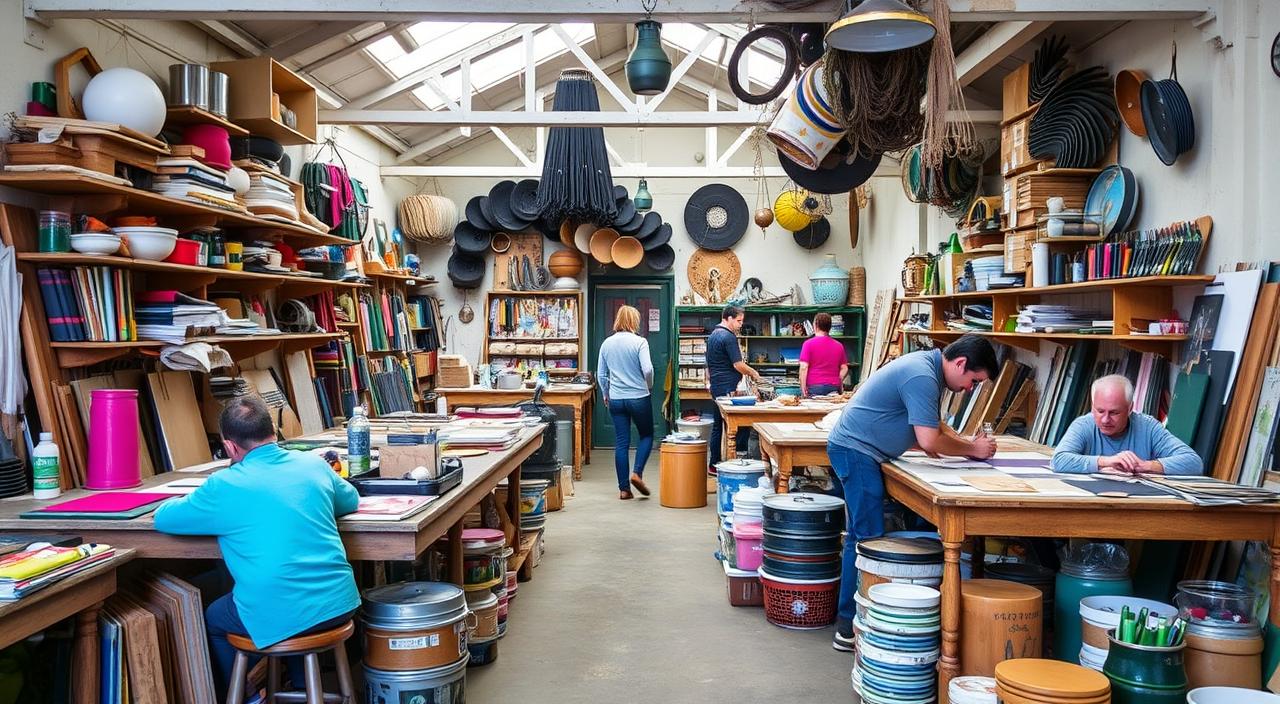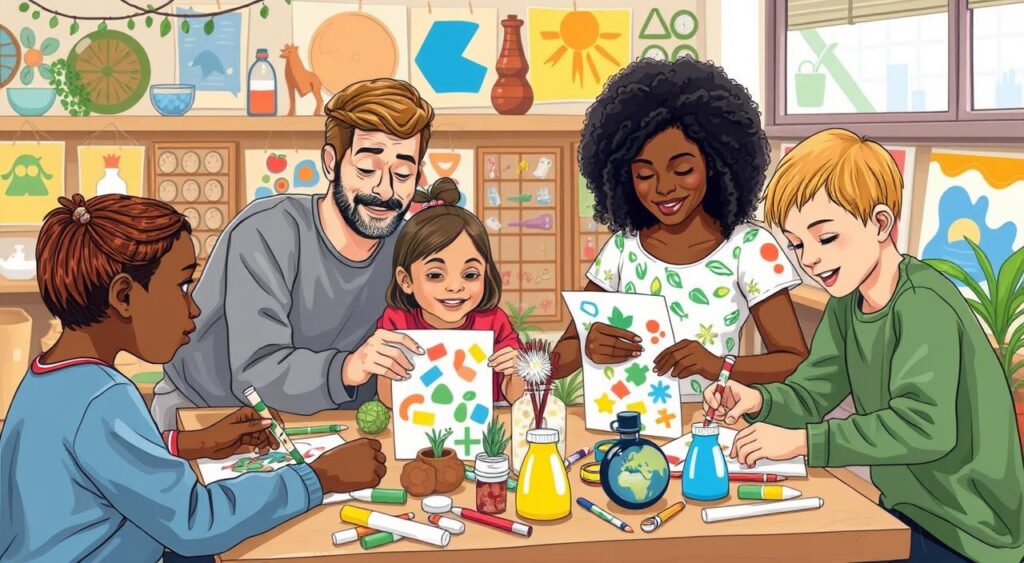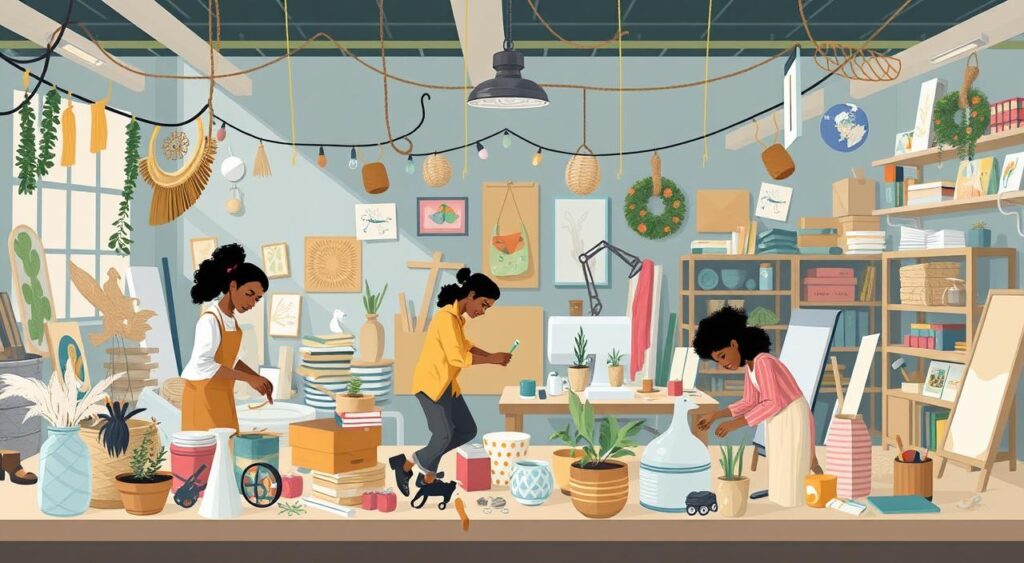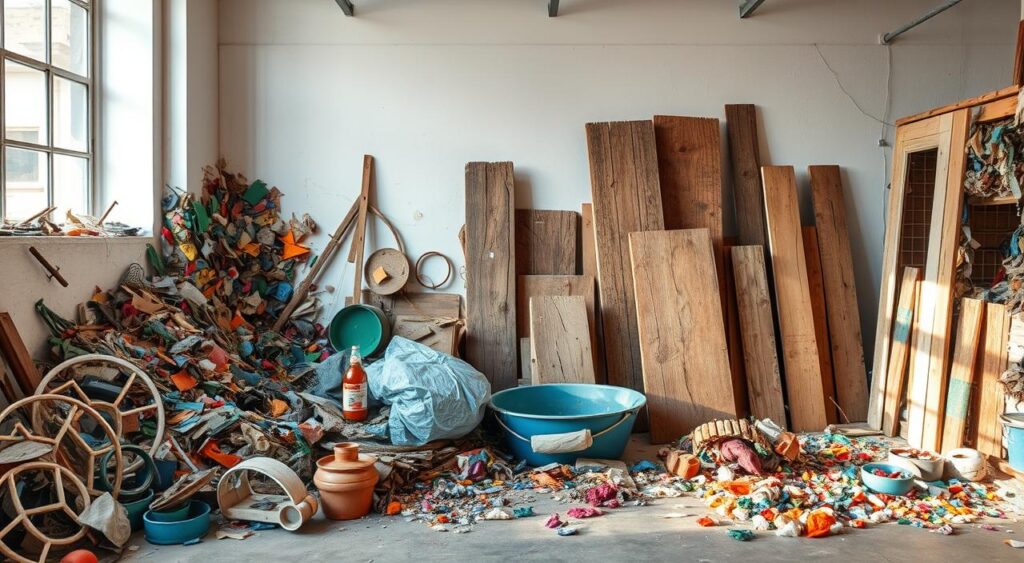London has become a dynamic center for creative upcycling, where discarded materials are transformed into breathtaking artistic creations. The city’s workshops lead a movement that blends environmental responsibility with artistic innovation, making sustainable art accessible to all. By repurposing everyday waste, these sessions teach participants how to craft unique, functional pieces while reducing landfill contributions.

Key Takeaways
- London’s workshops turn everyday waste into stunning artistic creations.
- Creative reuse promotes sustainability and reduces environmental impact.
- Art-making becomes inclusive, welcoming participants of all skill levels.
- Common household items like bottles and cardboard are repurposed creatively.
- Diverse techniques, from collage to sculpture, are taught across the city.
The Rise of Creative Junk Projects in London
The growing popularity of upcycling in London stems from heightened environmental awareness and economic incentives. The city’s rich cultural diversity fuels innovative approaches to repurposing materials, creating a thriving scene for sustainable art. What began as grassroots initiatives has evolved into a mainstream creative practice, amplified by social media platforms showcasing unique projects.
Pioneering organizations and artists have shifted perceptions about waste, encouraging mindful consumption in urban settings. London’s art schools and design institutions now integrate upcycling into their curricula, offering resources for students to explore sustainable materials. These efforts highlight innovative techniques and inspire others to embrace creative reuse.
For more insights into sustainable practices, check out our blog post on Eco-Friendly crafts for Beginners to discover how to start your own projects at home.
Why London Excels as an Upcycling Hub
London’s unique blend of industrial history and cultural diversity makes it a hotspot for upcycling art. The city’s past as an industrial powerhouse provides a wealth of discarded materials, while its multicultural influences inspire innovative designs. Waste management challenges have further fueled creative solutions, turning trash into treasure.
Artists draw inspiration from London’s gritty heritage, using materials like scrap metal and plastic to create bold, modern pieces. This environment fosters experimentation, giving new life to items that might otherwise end up in landfills.
To learn more about sustainable art practices, explore The Art of Recycling, an external resource detailing creative reuse across the UK.
Top Upcycling Workshops in East London

East London’s vibrant creative scene hosts a variety of workshops that celebrate sustainable art. These spaces combine community spirit with hands-on learning, teaching participants to transform waste into functional and decorative pieces.
The Junk Orchestra Workshop
This innovative workshop invites participants to craft musical instruments from discarded items like tin cans, plastic bottles, and containers. By blending creativity with sustainability, it offers a unique way to explore sound and design.
Hackney Recycled Art Project
Focused on community engagement, this project uses materials like cardboard rolls and paper to create art. It fosters environmental awareness while encouraging participants to experiment with textures and forms.
Bow Arts Upcycling Studio
This professional studio supports artists working with reclaimed materials, offering training in techniques like assemblage and functional design. It also hosts kid-friendly sessions to inspire the next generation of sustainable creators.
Creative Workshops in Central London
Central London’s prestigious institutions have embraced upcycling, offering workshops that merge sustainability with high-caliber artistry. These programs provide a platform for creative expression while promoting eco-friendly practices.
The Remakery Collective
This workshop teaches practical skills using reclaimed materials like paper and cardboard. It’s particularly popular with families, offering hands-on sessions for kids to explore sustainable crafts.
Tate Modern Junk Art Sessions
Tate Modern connects contemporary art with eco-conscious practices, offering workshops where participants create art from waste. These sessions blend creativity with environmental education.
V&A Sustainable Design Workshops
The V&A combines historical craft techniques with modern upcycling methods, teaching participants to create functional and decorative pieces from reclaimed materials.
For more on sustainable design, visit our post on Sustainable Art Practices to explore how creativity meets eco-consciousness.
South London’s Innovative Upcycling Spaces

South London’s upcycling scene thrives on community-driven initiatives that transform waste into valuable creations. These workshops foster collaboration and inspire sustainable practices.
Brixton Remakery
A hub for creative reuse, Brixton Remakery offers workshops in furniture upcycling and textile repurposing. Participants work with materials like cardboard and fabric scraps to craft unique pieces.
Peckham Materials Library
This unique space catalogs reclaimed materials for creative projects, serving as an incubator for local designers. It promotes the use of everyday waste, such as plastic bottles and packaging, in innovative designs.
For additional resources, check out Sustainable Living UK, an external site offering tips on reducing waste through creative projects.
Popular Materials in Creative Junk Projects
Upcycling in London transforms everyday waste into extraordinary creations, using a variety of accessible materials. These projects highlight the potential of items often discarded without a second thought.
Household Waste
Common items like egg cartons become textured wall art or biodegradable seed starters. Cardboard rolls and boxes are used in sculptures or functional designs, with playful additions like googly eyes adding character.
Industrial Discards
Materials like plastic offcuts and metal scraps are repurposed into larger-scale works. Tin cans become planters or lanterns, while plastic bottles are transformed into decorative or practical items.
Textile Remnants
Fabric scraps from fashion production add texture to mixed-media art. These materials create intricate patterns, enriching the upcycling scene with vibrant designs.
Techniques Taught in London’s Upcycling Workshops
London’s workshops offer a range of techniques to transform waste into art, empowering participants to create both decorative and functional pieces.
Assemblage and Collage
Participants learn to combine materials like paper and cardboard into dynamic compositions, using adhesives like glue and tape for durability and aesthetic appeal.
Functional Art Creation
Workshops teach how to craft practical items, such as storage solutions or decor, using techniques that ensure sturdiness and functionality.
Sculptural Techniques
Participants explore how to manipulate flat materials into three-dimensional forms, mastering joinery and surface treatments like painting and texturing.
For a deeper dive into creative techniques, read our blog post on Mastering Mixed-Media Art.
Family-Friendly Junk Art Workshops
London’s upcycling workshops are ideal for families, offering engaging and educational experiences that promote creativity and environmental awareness.
School Holiday Programmes
During school breaks, workshops provide kids with hands-on activities using materials like paper and egg cartons. These sessions encourage creative thinking and sustainable habits.
Weekend Family Sessions
Families can join weekend workshops tailored to various ages and skill levels, creating art together from reclaimed materials. These sessions foster collaboration and fun.
Environmental Impact of London’s Upcycling Movement
The upcycling movement in London significantly reduces waste while fostering community engagement. By repurposing materials, these workshops contribute to a more sustainable urban environment.
Waste Reduction Statistics
The following table highlights the impact of upcycling workshops on waste reduction:
| Material | Quantity Reused | Environmental Impact |
|---|---|---|
| Plastic Bottles | 10,000+ | Reduced plastic waste in landfills |
| Tin Containers | 5,000+ | Conserved metal resources |
| Cardboard Packaging | 8,000+ | Minimized packaging waste |
Community Engagement Benefits
Workshops promote recycling and educate communities on sustainable consumption. By extending material life cycles, they create a culture of environmental responsibility.
For more on waste reduction, visit Recycle for London, an external resource promoting sustainable practices.
How to Start Your Own Creative Junk Project at Home

Starting an upcycling project at home is simple and affordable. With basic tools and materials, you can create unique pieces while contributing to sustainability.
Essential Tools and Materials
Begin with everyday items and tools, as shown in the table below:
| Material | Potential Use |
|---|---|
| Cardboard Boxes | Storage, decorative items |
| Empty Bottles | Vases, pen holders |
| Cardboard Rolls | Crafting, decorative items |
| Paper | Collage, origami |
You’ll also need glue, tape, scissors, and paint to get started.
Simple Projects for Beginners
Try creating a collage with paper and glue or transforming a bottle into a decorative vase. Use tape to add geometric patterns to cardboard boxes for a modern look.
For beginner tips, check out our post on Starting Your Upcycling Journey.
Conclusion: The Future of Creative Upcycling in London
London’s upcycling movement is poised for continued growth, with innovative projects like wind chimes from tin cans and sculptures from plastic bottles inspiring both artists and communities. As technology advances, new methods for transforming waste are emerging, from architectural designs to public art installations. The city’s creative landscape thrives on collaboration, offering endless opportunities for artists, educators, and families to explore sustainable art.
By joining this movement, you can contribute to a greener future while unleashing your creativity. Start your upcycling journey today and discover the beauty of turning waste into art.